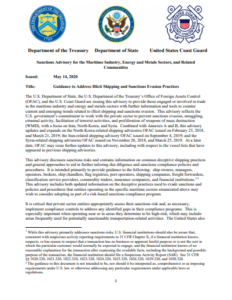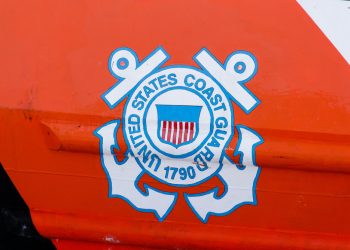The U.S. Department of State, the U.S. Department of the Treasury’s Office of Foreign Assets Control (OFAC), and the U.S. Coast Guard alert the maritime industry for deceptive shipping practices used to evade sanctions.
The advisory intends to provide actors that use the maritime industry for trade with information on and tools to counter current and emerging trends in sanctions evasion related to shipping and associated services.
The advisory includes a detailed set of best practices for private industry to consider adopting to mitigate exposure to sanctions risk.
The deceptive shipping practices discussed in this report may create significant sanctions risk for individuals and entities involved in these industries.
Deceptive Shipping Practices
- Disabling or Manipulating the Automatic Identification System (AIS) on Vessels
- Physically Altering Vessel Identification
- Falsifying Cargo and Vessel Documents
- Ship-to-Ship (STS) Transfers: STS transfers are frequently used to evade sanctions by concealing the origin or destination of surreptitiously transferred petroleum, coal, and other material.
- Voyage Irregularities: Malign actors may attempt to disguise the ultimate destination or origin of cargo or recipients by using indirect routing, unscheduled detours, or transit or transshipment of cargo through third countries.
- False Flags and Flag Hopping: Bad actors may falsify the flag of their vessels to mask illicit trade
- Complex Ownership or Management
General Practices for Effective Identification of Sanctions Evasion
- Institutionalize Sanctions Compliance Programs: Private sector entities assess their sanctions risk, implement sanctions compliance and due diligence programs, and provide training and resources to personnel in order to best execute those programs.
- Establish AIS Best Practices and Contractual Requirements: Entities in the maritime industry may wish to consider, based on their individual risk assessments, researching a ship’s history to identify previous AIS manipulation and monitoring AIS manipulation and disablement when cargo is in transit.
- Monitor Ships Throughout the Entire Transaction Lifecycle: As appropriate, consistent with their risk assessments, ship owners, managers, and charter companies are encouraged to continuously monitor vessels, including those leased to third parties.
- Know Your Customer and Counterparty Flag registry administrations, insurers, financial institutions, managers, and charterers should continue to conduct risk-based due diligence as appropriate.
- Exercise Supply Chain Due Diligence As appropriate, exporters and entities across the maritime supply chain are encouraged to conduct appropriate due diligence as relevant to ensure that recipients and counterparties to a transaction are not sending or receiving commodities that may trigger sanctions, such as Iranian petroleum or North Korea-origin coal.
- Contractual Language Members of the industry are encouraged to incorporate these best practices in contracts related to their commercial trade, financial, and other business relationships in the maritime industry.
- Industry Information Sharing Successful sanctions compliance programs often rely on fostering industry-wide awareness of challenges, threats, and risk mitigation measures.































































